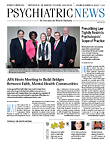New research shows that antidepressant pharmacotherapy does not appear to pose a risk for cardiac defects in infants born to women taking the medications during the first trimester of pregnancy—and this finding held true for medications that are contraindicated for pregnant women.
Researchers from Harvard Medical School conducted a large-scale study comparing the potential risk of congenital cardiac birth defects in offspring of mothers exposed to antidepressants during the first trimester of pregnancy with those who were not taking the drugs.
“In 2005, on the basis of early results of two studies, the U.S. Food and Drug Administration [FDA] warned health care professionals that early prenatal exposure to [the selective serotonin receptor inhibitor] paroxetine may increase the risk of congenital cardiac malformations,” said lead author Krista Huybrechts, Ph.D., an assistant professor of medicine at Harvard Medical School, during an interview with Psychiatric News. That same year, the FDA reclassified the drug in pregnancy category D for potential risks for ventricular defects in the fetus. (The agency describes pregnancy category D drugs as those in which “[t]here is positive evidence of human fetal risk based on adverse-reaction data from investigational or marketing experience or studies in humans, but potential benefits may warrant use of the drug in pregnant women despite potential risks.”)
Since then, Huybrechts said, several studies have shown associations between prenatal exposure to SSRIs and other antidepressants and offsprings’ cardiac birth defects, including a double and triple risk for obstruction of the right ventricular outflow tract with paroxetine exposure and ventricular septal defects associated with sertraline.
“It remained unclear, however, whether these associations were caused by the antidepressants alone, due to chance because many associations were tested, or due to potential problems with the design of the studies,” said Huybrechts, who is also a pharmacoepidemiologist at Brigham and Women’s Hospital in Boston. “We conducted a study to test one specific hypothesis—risk of cardiac malformations—in a population large enough to enable us to detect relatively small increases in risk to offspring of mothers taking antidepressants during pregnancy.”
In the current study, Huybrechts and colleagues gathered data from nearly 950,000 pregnant women insured by Medicaid from 2000 to 2007. Participants were divided into two cohorts: those who were exposed to antidepressants—including any SSRIs, serotonin-norepinephrine reuptake inhibitors, and tricyclic antidepressants—during the first 90 days of pregnancy and those who were not exposed. Infant birth defects were categorized as right ventricular outflow tract obstruction, ventricular septal defect, or other cardiac malformations.
Study findings, published in the June 19 New England Journal of Medicine, showed no significant difference in congenital cardiac defects among babies born to women who took antidepressants during the first trimester and those who did not. In addition, the study found no association between ventricular abnormalities in offspring and maternal exposure to paroxetine or sertraline—two of the most frequently used SSRIs among participants. The results were consistent after adjusting for preexisting general medical conditions and mental disorders of the mothers. No dose-response relationship was found.
“Our results do not support earlier findings of an association between antidepressant use and cardiac anomalies, in particular, findings with respect to the use of paroxetine and sertraline,” the researchers concluded.
Nada Stotland, M.D., a professor of psychiatry at Rush University in Chicago and an expert in OB-GYN psychiatry who was not involved in the study, said in an interview with Psychiatric News that the current findings offer reassurance to the field of psychiatry regarding prescription practices for pregnant women with depression.
“Nevertheless,” Stotland said, “psychotherapy is the optimal first choice for treatment for mild to moderate depression during pregnancy; there are no negative side effects, and the patient can also benefit from the support and insight intrinsic to psychotherapy.” Stotland, a former APA president, emphasized that more-serious episodes of depression do warrant a trial of antidepressant medication, because “untreated depression poses risk for mother, fetus, and newborn.”
Huybrechts agreed. “Decisions by clinicians and women about whether to continue or discontinue treatment with antidepressants during pregnancy must balance potential risks of treatment with risks of not treating the depression,” she noted. “This study addresses only one piece of the complex puzzle about the safety of antidepressants during pregnancy . . . [and the findings] should not be seen as evidence that antidepressants are safe during pregnancy.” Huybrechts concluded that more research is needed to generate “high-quality” evidence on other potential risks and benefits of using these medications.
The study was funded by the Agency for Healthcare Research and Quality and the National Institutes of Health. ■
An abstract of “Antidepressant Use in Pregnancy and the Risk of Cardiac Defects” can be accessed
here.

